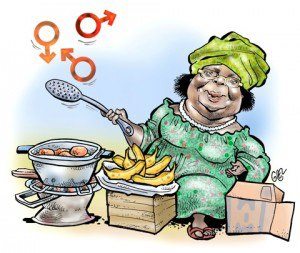This week on Heart Of Africa, Kudakwashe discusses 2 fundamental topics with Malawi based media scholar, writer, social & political analyst, Jimmy Kainja.
The first topic focuses on Malawi’s President Joyce Banda’s first year in office. This has been marked with remarkable diverse challenges for the nation, as leadership transitioned from Bingu Wa Mutharika’s mixed legacy, that had resulted in him severing relationships with the West, to President Banda’s attempts to repair and restore these.
In addition to mending relations with the West, and their allied donors, President Banda has been faced with another challenge of fixing the ailing economy she inherited from her predecessor. Part of this has been accepting IMF-led economy recovery programmes, that always come with stringent and detrimental conditions. Hence there has been an imposed devaluation of the Malawian currency, the Kwacha by about 50%.
As is known with such programmes, Africa’s poor suffer the brunt of IMF’s measures, though their governments receive “aid”. Malawi’s less privileged, alike, are suffering today. Due to this, analysts like Jimmy have questioned, “Joyce Banda: IMF’s Good Girl or a Victim of Malawi’s Economic Dependence?“
Jimmy brings in a crucial view point about the balances required that President Banda has been faced with i.e. winning donor confidence versus rebuilding Malawi’s economy. In other words, balancing between what the Malawian people want for their economy’s revival, or what the donors desire for them to look at Malawi’s government favourably.
He makes a critical discussion on the difference between “politicking” and “governance”, elaborating that President Banda like many African leaders has also focused on winning the next election and finding mechanisms that would help her to do so, instead of finding ways of truly governing Malawi.
The discussion also examines wide ranging matters, with an emphasis for Africa to develop itself to the point where we are not dependant on aid, from the West or the East, North or South. Aid is enslaving, yet we can become master engineers of our own economies to ultimate restoration and prosperity.
The second topic titled, “Transforming Africa’s Image Through Africa’s Own Media“, aims to project that Africa’s own media is responsible for, and can transform, Africa’s widely believed demeaning image that has prevailed century upon century.
One of Africa’s renowned author’s Binyavanga Wainaina asserts that it is time to ‘Rewrite Africa’, as there is a dire need to challenge the dominant narrative about the continent. He adds that critics, including, aid organisations, foreign diplomats, politicians and journalists, for many years, have given the perception of our vast continent, as a “convenient photo-opportunity to illustrate victimhood and desperation.” This has boosted the West to perpetuate stereotypes about Africa’s multi-faceted nature.
Ian Birrell, the speechwriter for David Cameron in 2010 election and former deputy editor of the Independent (UK) wrote, “Our image of Africa is hopelessly obsolete. The huge advances the continent has made in recent years have yet to be acknowledged by the West”.
Ian adds that a few countries actually represent the disconnect between outdated western perceptions of Africa and fast-changing realities of thriving economies. Illustrating that Africa’s picture of amazing progress, is far removed from normal stereotypes revealed by much of Western media and their allies in lobbies for “aid”.
Ian also states that Western media offers simplistic images of death and destruction, while ignoring the advancing realities of a continent where life is becoming more peaceful and prosperous – though his view of economic growth seems to be focused on capitalism.
In view of all this, Jimmy gives facets of the development of African media from education to broadcasting. He shows that there are 3 main agencies in the world that dominate global media and hence responsible for strongly dictating how, what and when, news is disseminated. He further explains the use of media as “soft power” used to influence the masses on who to elect for Presidency, with formulated reasons why. The same tactic is used with the aim to justify military interventions in Africa.
Jimmy further describes the hierarchy of media where for example matters in USA are given prime focus even if more trivial, in comparison to matters in Pakistan or D R Congo that are given less focus even if there is more need for greater exposure – especially if the USA is involved in those matters. The dynamics are the same even when it comes to certain world personalities.
The discussion is not short of highlighting the persecutions and injustices carried out against journalists in countries like Ethiopia where press freedom lacks.
Jimmy cements his discussion on media by challenging Africans to develop their own excellent and independent media, free from Western funding or influence, and for Africans to eagerly challenge Western media practices and media content where required, bringing to light true facts, like he has done in the past.
Kudakwashe concludes the programme with plausible biblical perspectives. Using biblical examples, she shares wisdom on how women in leadership can change the tides of political, economical and religious norms. In regard to Africa’s media, Kudakwashe speaks on the power of positive words, a profound message not only on projecting the truth about Africa, but becoming the truth of who we desire to be accepted as, as Africa.
Jimmy has specialist interest in political and social change in sub Saharan Africa, Malawi in particular. He is a former media lecturer and seminar leader at London Metropolitan University’s Faculty of Applied Social Sciences. He has written for wide ranging regional international newspapers and magazines. For more on his work, listeners are invited to visitwww.jimmykainja.co.uk.
Source: http://heartofafricamedia.com/2013/04/24/heartofafrica240413/





No comments! Be the first commenter?